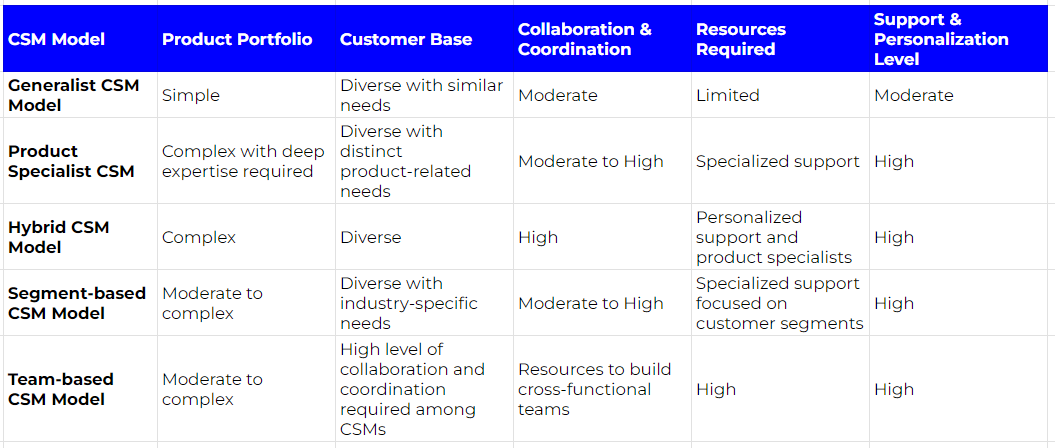As a customer success leader, one of the primary challenges you may face is how to best support customers who use multiple products from your company's portfolio. To help you navigate this challenge, we've outlined five common customer success management (CSM) models that can be used to support customers with various product combinations. By understanding the strengths and limitations of each model, you can make an informed decision about which approach is best suited for your organization.
Here are the common models we’ve seen and how to evaluate the ones most appropriate for your business. There may be combinations as well - single CSM for small multi product accounts vs. a Relationship CSM and Product Specialists for your largest accounts.
The Generalist CSM Model: “THE Single Point of Contact”
The Generalist CSM Model assigns each customer success manager to be well-versed in all the company's products. This approach provides customers with a single point of contact for any product-related inquiries, simplifying communication. However, the model may fall short when dealing with highly specialized or complex products that require in-depth expertise.
The Product Specialist CSM Model: Focused Expertise
The Product Specialist CSM Model involves assigning CSMs with expertise in specific products to customers who have purchased those products. This model ensures that customers receive top-notch support tailored to their specific product needs. However, coordinating and communicating between multiple CSMs may require additional effort to maintain a seamless customer experience.
The Hybrid CSM Model: Why Not Both?
The Hybrid CSM Model combines the strengths of the Generalist and Product Specialist models. Customers are assigned a primary generalist CSM for most inquiries, while product specialists are available for more complex product-specific issues. This approach ensures a consistent point of contact for customers while providing specialized support when needed.
The Segment-based CSM Model: Organize Around Segment-based Patterns
In the Segment-based CSM Model, customers are assigned CSMs based on their industry, company size, or location. These segment-focused CSMs have knowledge about multiple products relevant to their assigned customer segment, allowing them to offer targeted support. This approach is particularly helpful for addressing the unique needs and challenges faced by customers in different segments.
The Team-based CSM Model: Hop in the Pool!
The Pooled CSM Model organizes customer success managers into cross-functional teams responsible for supporting specific customer groups. Each team consists of generalist and product specialist CSMs, ensuring comprehensive support for customers using multiple products. This model fosters collaboration and knowledge sharing, leading to a consistent customer experience.
